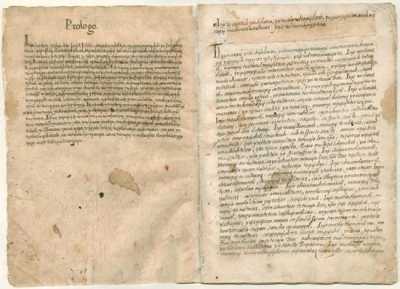Languages in Spain
The 1978 Constitution states the official language of Spain is Castellano.
The 1978 Constitution states the official national language of the Spanish State to be ‘Castellano,’ Castilian, and is spoken in all Spanish territory. Article 3 states that all Spaniards have the duty to know it, and the right to use it.

The writings of Franciscan Monk, Bernardino de Sahagún - Photo www.britannica.com
The name comes from the former Kingdom of Castile, and was declared the official language of Spain in 1714. The language is generally referred to in English as ‘Spanish,’ and by Spaniards as ‘español’ when differentiating from other national languages, and as ‘castellano’ when comparing it to other regional languages or dialects spoken within Spain. The latter is also used when referring to correct grammatical speech
It’s the most widely-spoken Romance language in the world, and is spoken by some 330 million people as a first language.
The Constitution also recognises the right of the Autonomous Communities to use their own languages and state them to be the official regional language in their respective Statutes of Autonomy.
Four regional languages are recognised as official in Spain:
Catalan (catalá/catalán) is jointly recognised with Spanish as the official language of Cataluña and the Balearic Islands. A Romance language which has characteristics in common with both French and Spanish, it is widely spoken in the two regions, as well as in the south of France, some parts of Aragón, Andorra – where it is the national language - and in the town of Alghero in Sardinia.
The reformed version of Cataluña’s Statute of Autonomy recognises occitano/aranés, spoken in the Valle d’Arán, as a co-official language.
The Basque language (euskera/vasco) is recognised as the official language of the Basque Country (Euskadi/País Vasco), and is also spoken in Navarra and in the Pyrénées Atlantiques in France. Dating back to pre-Roman times, it’s the only western European language which is not part of the Indo-European family. Linguistics have yet to confirm a definite relationship with any other known language.
Galician (galego/gallego) has co-official status in the Galicia region. The language has close links to Portuguese and is also spoken in parts of Asturias and Castilla y León.
The Valencian language (valencià/valenciano) has co-official status in the Valencia region. Most linguists see it as a dialect of the Catalan language by virtue of mutual intelligibility.
The Asturian language (asturiano/asturianu, also known as bable) has no co-official status, but is protected under the Principality’s Statutes.
The Statutes of the Autonomous Community of Aragón give protection to the several linguistic variations of Aragonese (aragonés).
There are also a number of regional dialects spoken in Murcia, Extremadura, Castilla y León, the Balearic Islands, Canary Islands, Andalucía Castilla La Mancha.
